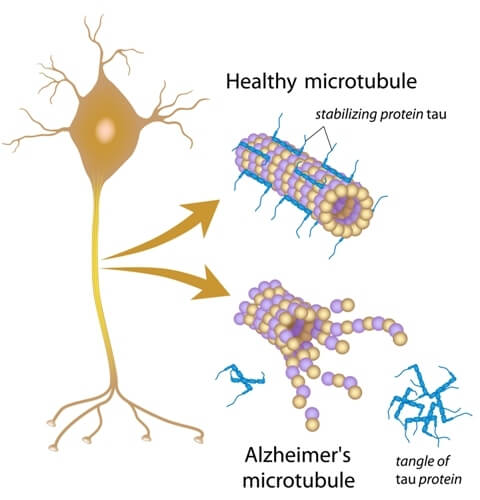Similarities between Alzheimer's disease and Down syndrome attract attention

Is Alzheimer's disease an acquired form of Down syndrome? When neurologist Huntington Potter raised the question in 1991, Alzheimer's disease researchers reacted with skepticism. At that time they were just beginning to discover the causes of memory loss in neurological diseases. Scientists already knew that at the age of 40, the brains of almost all people with Down syndrome, caused by an extra chromosome 21, are filled with beta amyloid peptide that forms a plaque that suffocates the nerve cells. Beta amyloid is also a hallmark of Alzheimer's. The researchers also knew that the gene containing the code for the protein resides on chromosome 21, hence people with an excess of chromosome 21 produce more peptide and accumulate more layers on the nerve cells in their brains. Potter suggested that if people with Down syndrome develop Alzheimer's due to an excess chromosome 21, then it is possible that healthy people also develop Alzheimer's for the same reason. A quarter of a century later, evidence is beginning to pile up to support the idea.
The growth of plaques in the brain is a hallmark of Alzheimer's disease.
"What we hypothesized in the 90s, and now evidence is emerging to support this, is that in Alzheimer's patients molecular errors occur that cause the production of cells with three copies of chromosome 21," says Potter, who was recently appointed director of Alzheimer's disease research at the University of Colorado School of Medicine, with the express purpose of researching Alzheimer's From the perspective of Down syndrome.
And he is no longer the only one who discovered the connection. In recent years, dozens of studies have shown that Alzheimer's patients have an excessive amount of cells similar to those of Down syndrome. Russian scientists showed in 2009 that 15% of the nerve cells in the brains of Alzheimer's patients contain an excess copy of chromosome 21. Others have shown that Alzheimer's patients have 1.5 to 2 times more skin and blood cells with an excess copy of the chromosome compared to healthy people. Potter suggested based on his research in mice that Alzheimer's patients have a vicious circle: when normal cells are exposed to beta amyloid peptide, they tend to fail during division and produce more cells with three copies of chromosome 21, and these in turn form more layers. In an August 2013 paper published by Potter and his team in the Journal of Neurobiology of Aging, they report that inhibition of a particular enzyme causes these errors.
Meanwhile, researchers from the University of Kentucky have collected brain scans, blood samples and lifestyle surveys of dozens of adults with Down syndrome over the past five years. The aim of the study was to understand why only 60% to 80% of them developed delirium even though almost all patients developed plaques in the brain.
Francis Collins, director of the US National Institutes of Health (NIH), told a Senate subcommittee that there was "strong interest" in studying the two conditions together. And in 2013, the Alzheimer's Association partnered with the Linda Kernick Institute for Down Syndrome in funding a study examining this connection.
In general, studying Alzheimer's in a smaller community, such as those with Down syndrome who are certain to develop the pathology, may provide scientists with more information more quickly, says Dean Hartley, director of scientific initiatives at the American Alzheimer's Association. He and others say it is too early to conclude that Alzheimer's disease is a form of Down syndrome, "but we need new ideas like this in the field to better understand the pathways that operate at the basis of the disease."
The article was published with the permission of Scientific American Israel
